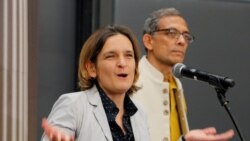A study found on Tuesday that the share of household wealth owned by billionaires has risen by a record amount during the pandemic. Millionaires are also coming out of COVID-19 ahead.
The World Inequality Report is produced by a network of social scientists. The report estimated that billionaires this year collectively own 3.5 percent of the world household wealth. This is up from a little more than 2 percent at the start of the pandemic in early 2020.
Lucas Chancel was the lead writer. He said the COVID crisis has worsened the inequalities between the very rich and the rest of the population. He noted that rich economies used massive financial support to lessen the increased rise in poverty seen elsewhere.
The report used different specialist research and public information. The opening part was written by U.S.-based economists Abhijit Banerjee and Esther Duflo. They were two of three economists who won a 2019 Nobel for work on poverty.
They wrote, "wealth is a major source of future economic gains, and increasingly, of power and influence…,” which predicts even more increases in inequality. They were writing about what they called an "extreme concentration of economic power in the hands of a very small minority of the super-rich.”
The findings confirm what many different existing studies, “rich lists,” and other evidence found, pointing to a rise in health, social, sex, and racial inequalities during the pandemic.
Forbes magazine publishes yearly a list of the world’s billionaires. This year it includes a record-breaking 2,755 billionaires with a combined worth of $13.1 trillion, up from $8 trillion last year.
The new report showed that a wider group of 520,000 adults who make up the top 0.01 percent richest together saw their share of global wealth hit 11 percent this year. This is up from 10 percent the year before.
It said belonging to the top 0.01 percent richest means having a household wealth of at least $19 million. This was set for different amounts among different countries based on what a dollar could buy.
Researchers say some super-rich have gained from the move to online of much of the world’s economy during lockdowns. Others simply gained from the value of what they owned, which raised as financial markets put money into the recovery of the economy.
The study also found that poverty greatly increased in countries with weaker government support. It found that large government support in the United States and Europe was able to deal with at least some of the effects on lower earners there.
Chancel said, "This shows the importance of social status in the fight against poverty."
I’m Dorothy Gundy.
Mark John reported this story for Reuters. Gregory Stachel adapted it for VOA Learning English. Susan Shand was the editor.
____________________________________________________________
Words in This Story
network – n. a group of people or organizations that are closely connected and that work with each other
wealth – n. a large amount of money and possessions
poverty – n. the state of being poor
source – n. someone or something that provides what is wanted or needed
concentration – n. a large amount of something in one place






